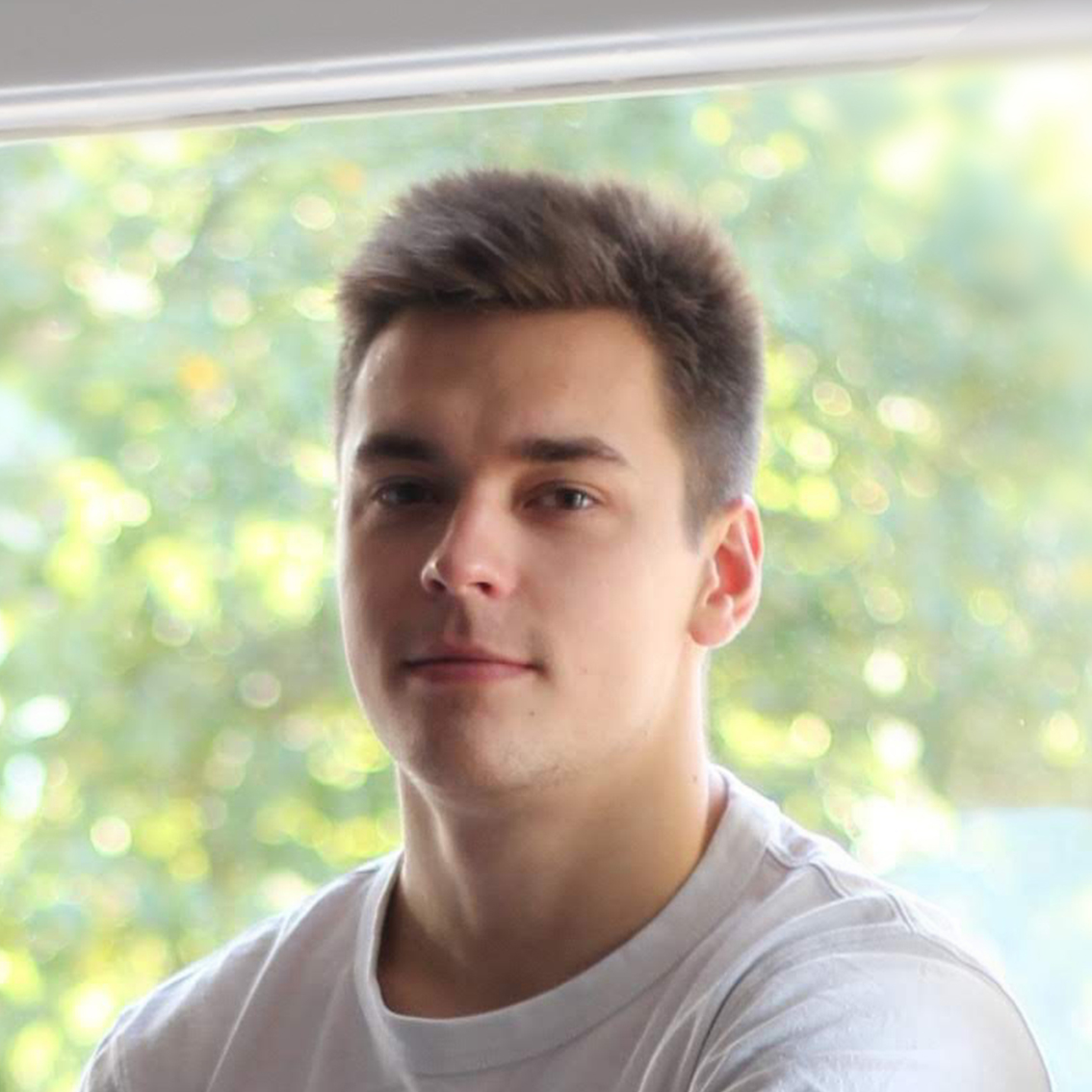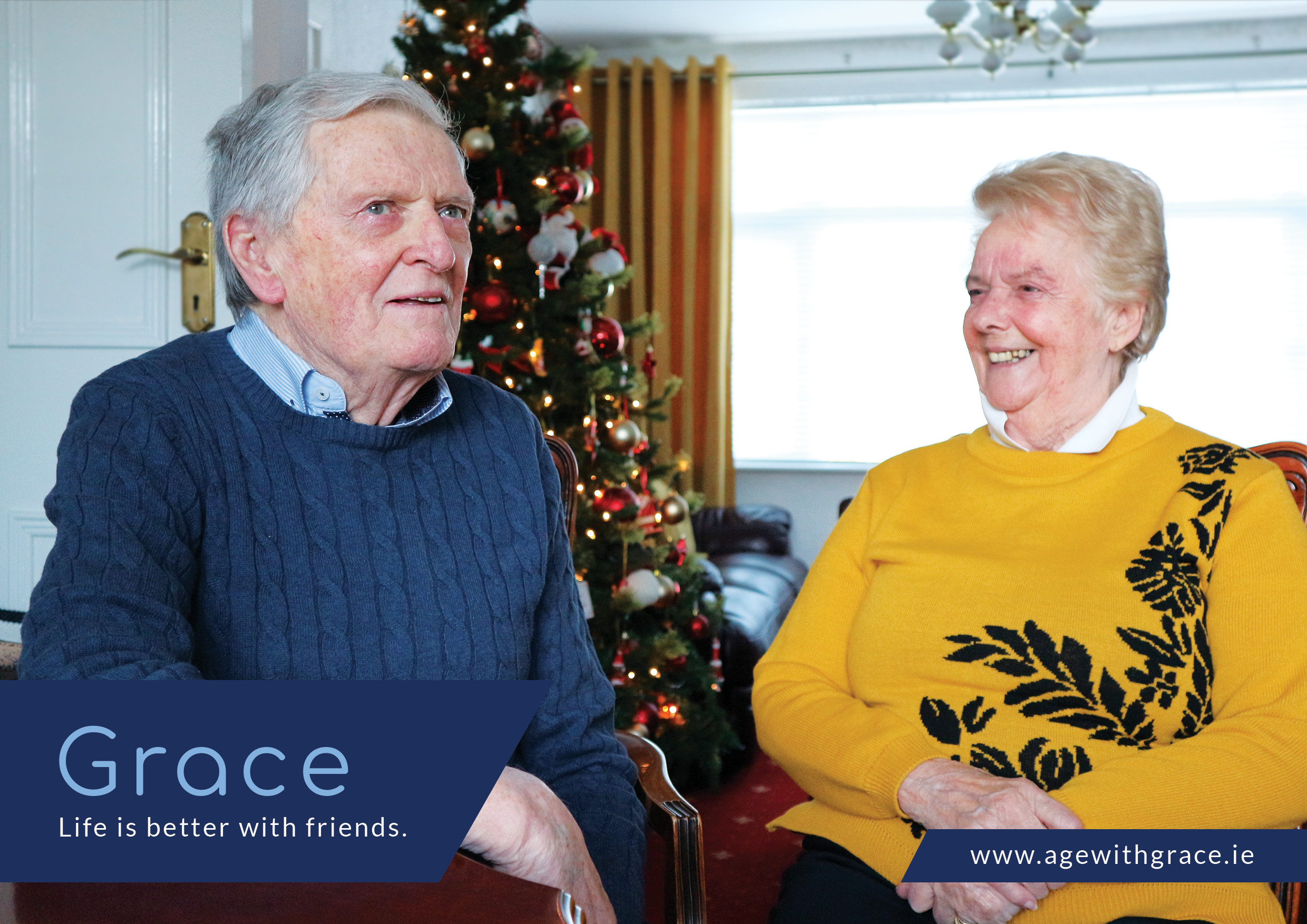
Grace
Duration: 12 weeks
Brief
This Project was based on the brief "AI100" from Royal Society of Arts Student
Design Awards
"How might we use AI to support people to reach a happy, meaningful and
productive one hundred year life?"
Our goal was to identify what issues older people were facing
and what can be done to help them.
Intro
Grace is a dynamic, always up-to-date, AI-Powered database of services that saves primary-care professionals hundreds of hours and connects isolated older people to local services.
My Teammate
Research
Problem Identified: Social Isolation
Early on in our project we chose to narrow down to
mental health as while there are a lot of problems older people face,
they all link back to mental wellbeing.
More than 2 million people over 75 live alone and more than a
million go over a month without speaking to a friend, neighbour
or family.
Research showed us a growing issue,
greatly impacting the ageing population. Social Isolation.
To narrow down the brief even more:
How might we use AI to bring older people together and help them get closer to a happy, meaningful and
productive one hundred year life?
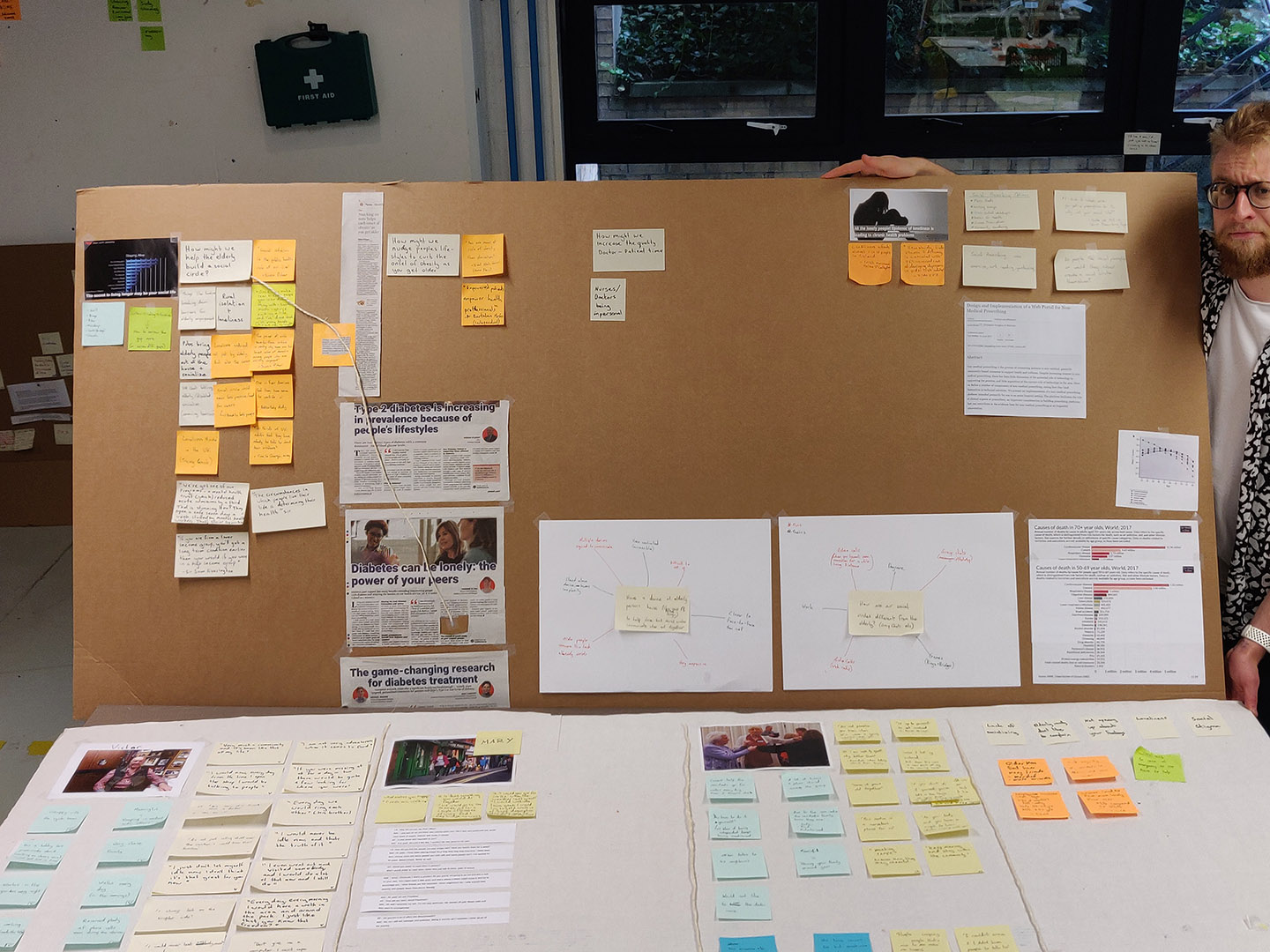
Our research board
“I’m in the art classes as well you know”
“But now it’s after closing because they can't get the funds for it”
“I used love going there every wednesday”
Barbara
User Interviews
To further investigate the importance of communities and
connections, we talked to a variety of older people at different
stages of independence on what life is like for them and what
issues they might be facing.
This solidified our earlier findings as what coming up was
how vital close friendships and communities were to them.
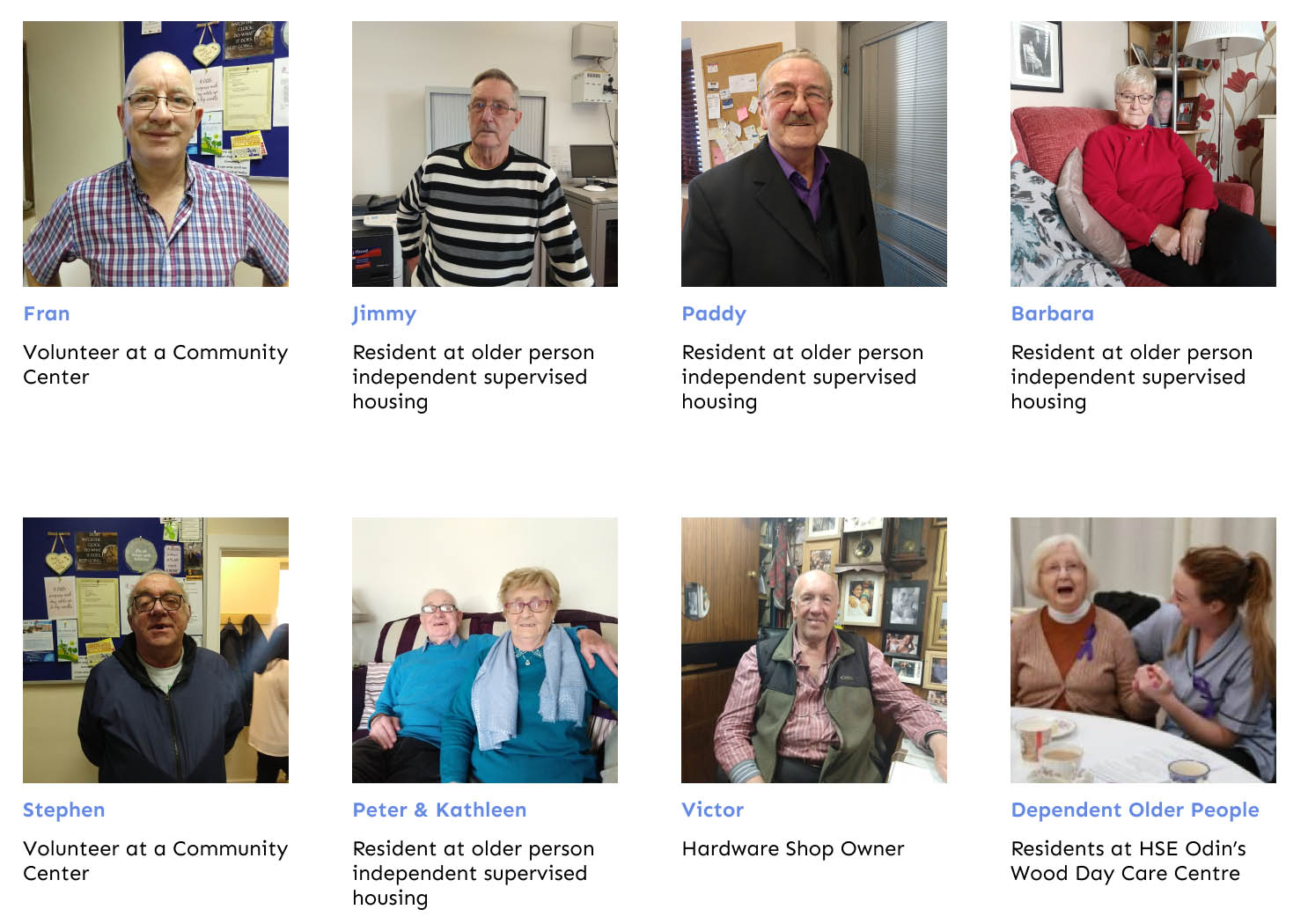
Older people we interviewed
“There was a place out here called a man shed”
“The daughter found it on the internet or whatever”
“I don’t know whether it’s closed or what the story is”
Paddy
Expert Interviews
To ensure we had tackled the brief from every angle,
we reached out to several key individuals with different
areas of expertise pertaining to the health and care of
older people.
Dr David Robinson introduced us to the innovative practice
of Social Prescribing which is an alternative means of
treatment and a way of enabling GPs and other primary care professionals to
refer people to a range of local, non-clinical social activities
and services withing the community.
These can include physical activities,
reading groups, Men's Sheds, community gardening and arts.

Professionals we interviewed
How Social Prescribing Can Help
People who engage with Social Prescribing
have shown significant improvements in health.
There has also been a push in recent years for GPs
to use the MECC approach, or Make Every Contact Count.
Unfortunately, since Social Prescribing is a
relatively new practice in the UK and Ireland,
there is currently no robust infrastructure in
place to support it.
“We know what the weather’s going to be like, we know what we have to report on our bed numbers twice a day to the government. But I couldn’t tell you what’s happening within 500 metre radius of this hospital this morning”
Dr. David Robinson,
Consultant Physician-Geriatric Medicine
Barrier to Social Prescribing
We were told of how there is a severe lack of awareness
when it comes to knowledge of local services in the area.
This in turn meant that when trying to prescribe a
service or activity to someone, it resulted in making
a thousand phone calls to find out what is available
around them.
Key Problems
What Is Missing?
The biggest challenges that is slowing
down the use of Social Prescribing and MECC
is that there’s no centralized resource for
finding suitable services efficiently.
In addition to that, a lot of the information
about services found online is outdated.
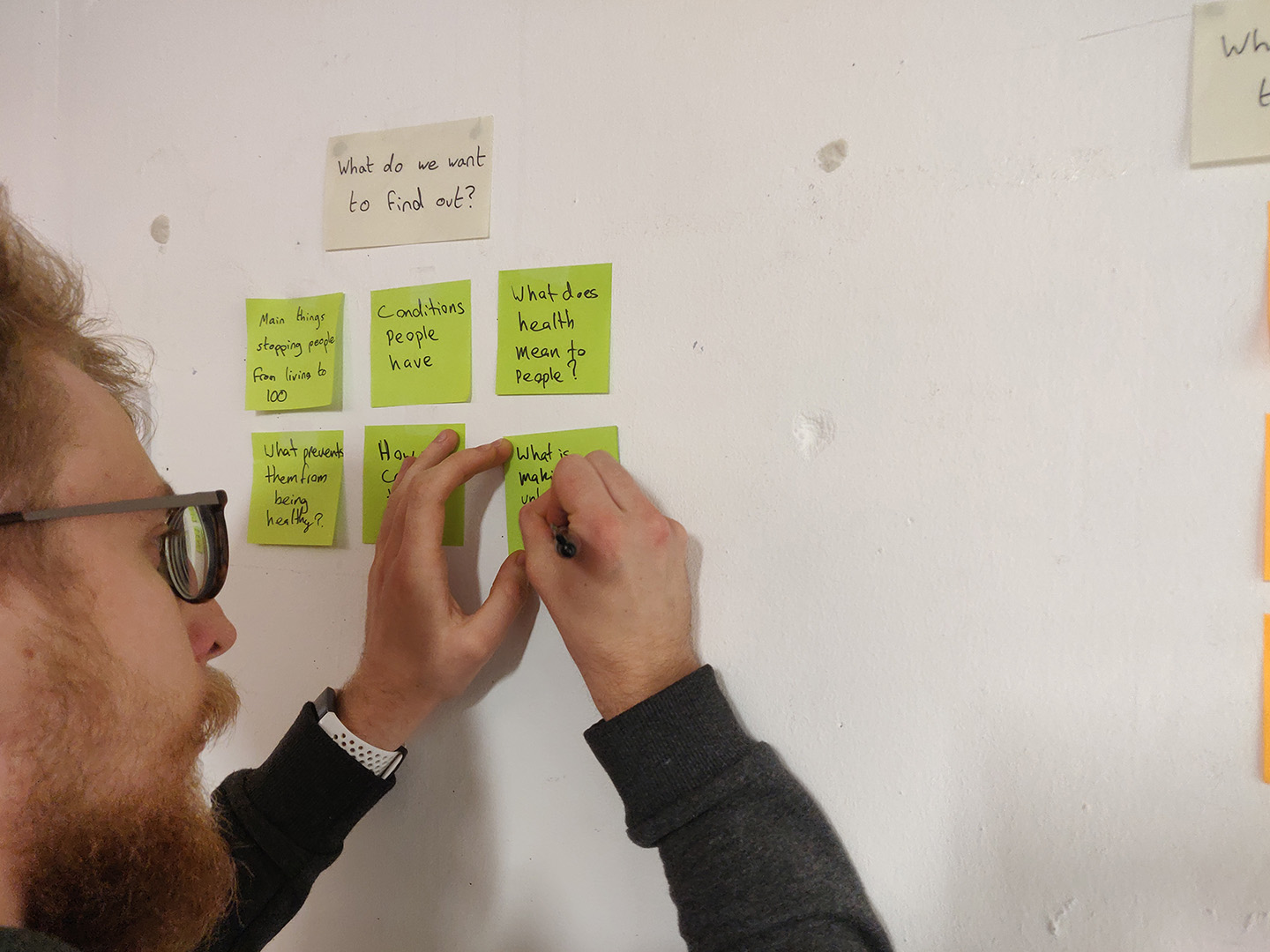
Settings goals of what we need to identify
“In any social prescribing scheme, the first thing the person does is find out around them, and that means making a thousand phone calls”
Dr. David Robinson,
Consultant Physician-Geriatric Medicine
Opportunity for Innovation
There needs to be a place for
all the local services to live, like
a database listing the local services
and activities
This was attempted before, however it took many hours as they used students to gather information on local services, which ended up soon becoming outdated.
This showed us there is a need for such a platform and that it is possible. However it needs to be approached differently to make it work effectively.

Ideating on how we can address this problem
Ideation
Proposed Solution
We created 3 different concepts and presented them to our tutors
and the medical professionals we interviewed.
Hands down, “Grace” was the one they picked.
Grace searches the internet and existing databased of services and activitiers.
Grace then uses it's natural language processing to call the
service providers and confirm the information is correct.
Grace then submits them to it's live database that doctors and link workers
can interface through the website and prescribe older people
activities or communities.
This would save countless of hours of calling and
they can recommend services and activities knowing
that the information is reliable and up to date.
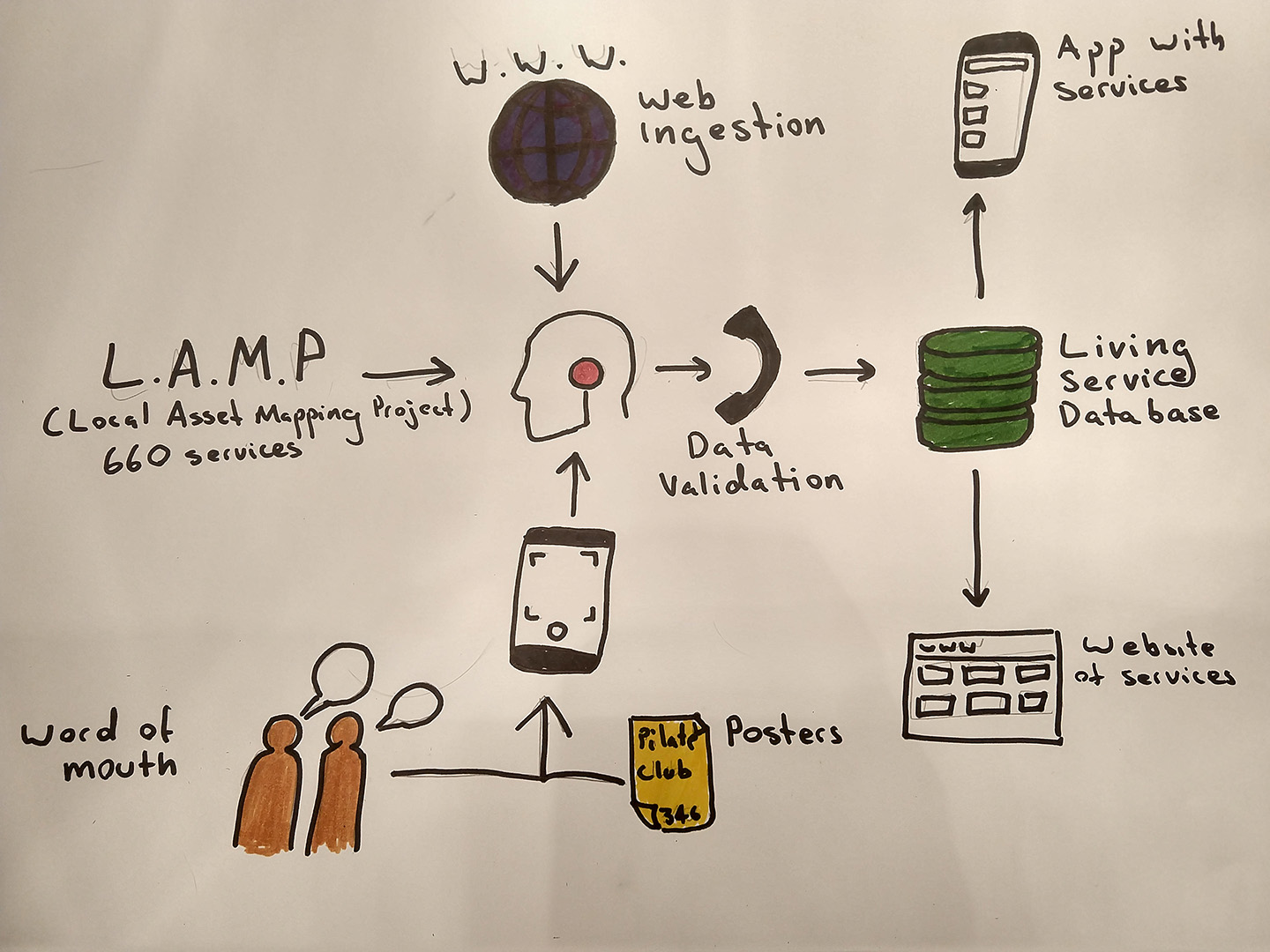
Rough Grace concept map
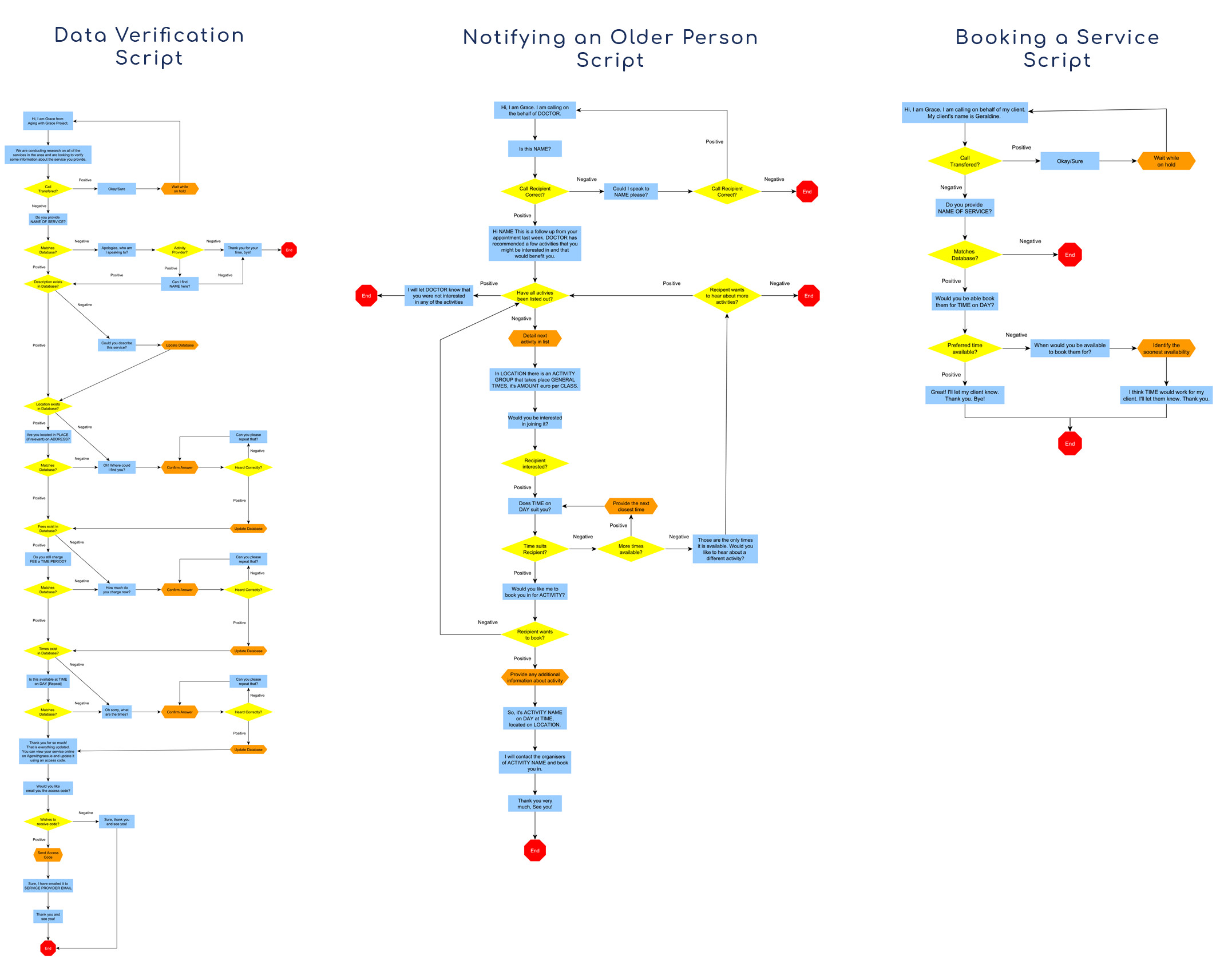
Speech Paths for Common Conversations
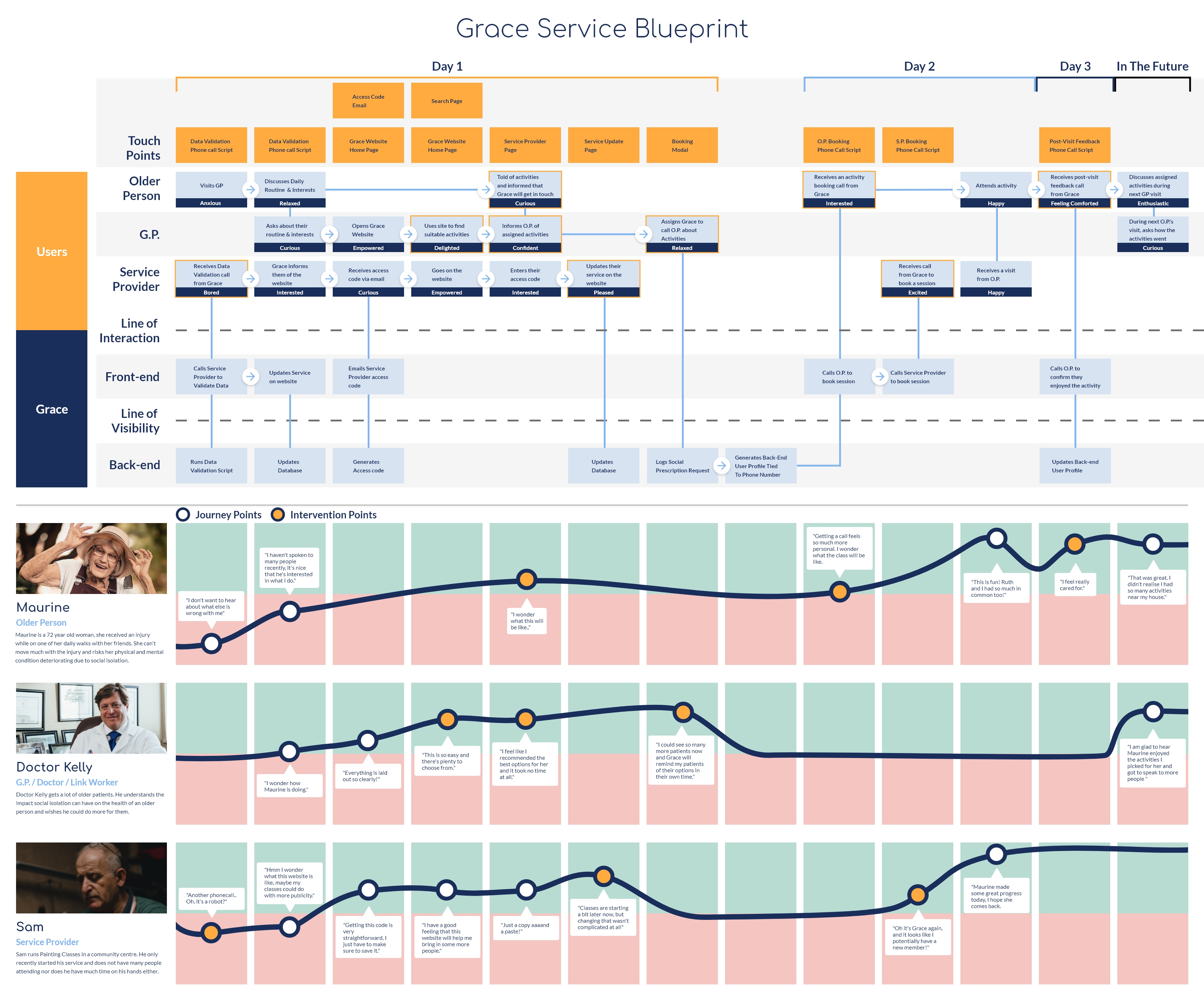
Blueprint Envisioning The Whole Service
GP’s Interface Using a Website
Information on services will be ingested into a database and sorted.
Grace will inform the core users in two main ways. One is through a website which can be used by healthcare providers as part of their social prescription consultation, enabling them to make every contact count, as well as by older users themselves, their families or caregivers.
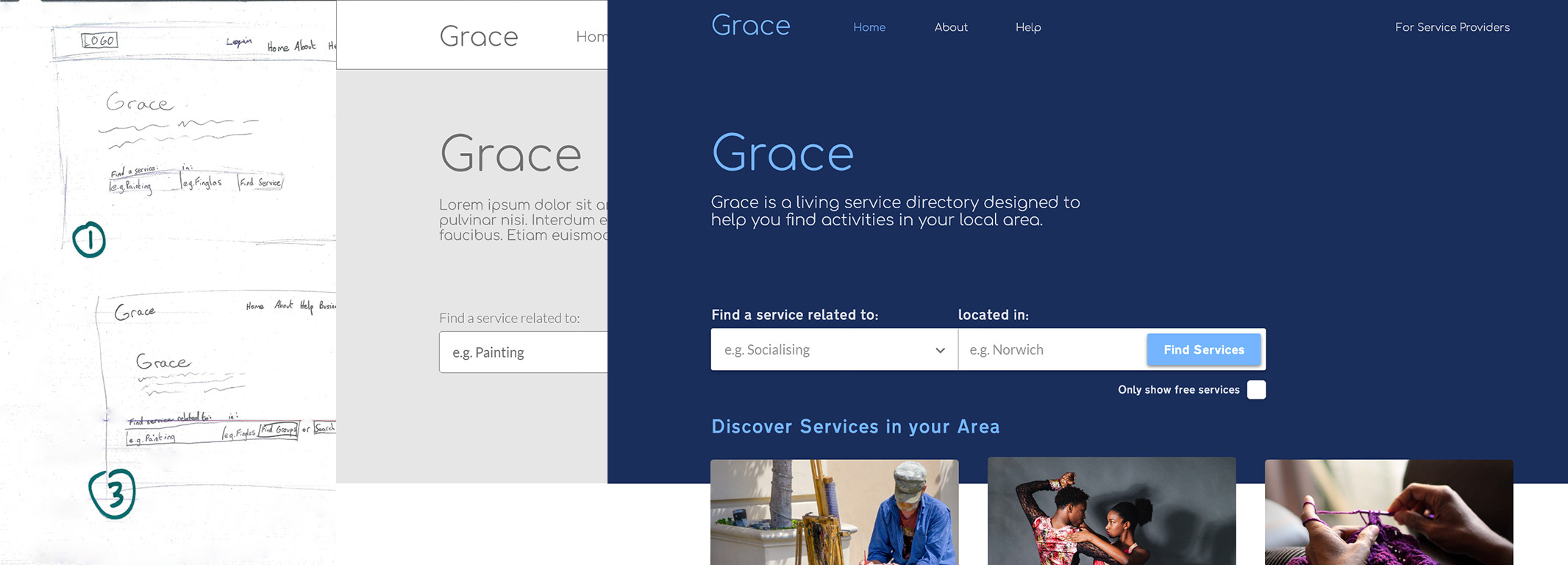
Website iterations
Older People Interface Using VUI
The other way Grace interacts with people is by using a technology they are already familiar with: a phone call, using said natural language processing to talk to them in a language they understand.
Evaluation
How We Tested The VUI
For the Voice User Interface, script making was an on-going agile design iteration process, every new version of the script we made we tested up to 10 times, calling a service provider while posing as the AI, iterating then trying again.
Testing was done with a soundboard with our pre-recorded lines to force us to stay on script. Even with low-fidelity prototyping and a mediocre text-to-speech engine we were successful in obtaining service information.
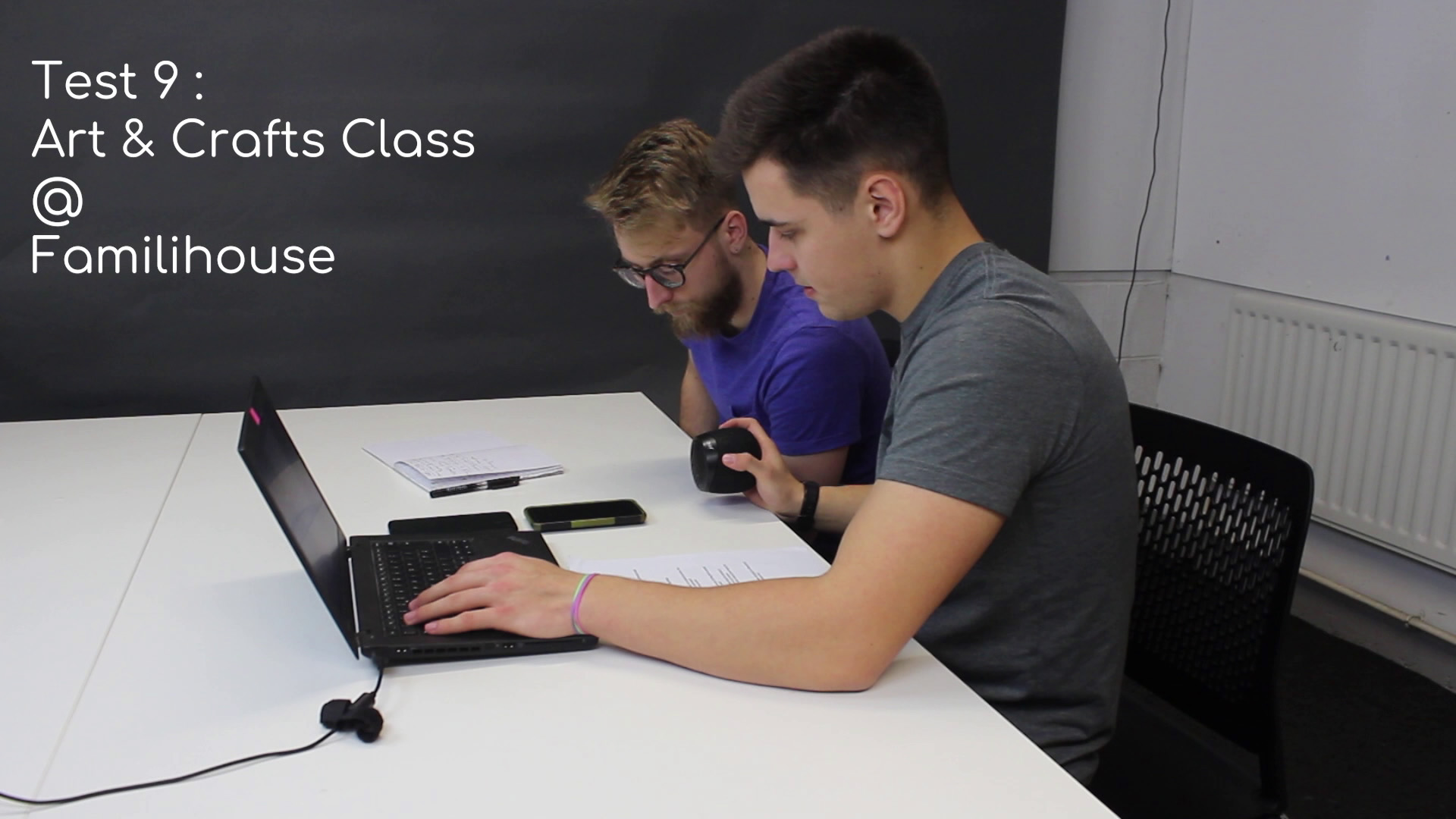
Testing the VUI with Service Providers
Website Testing
Designing the website for Grace, we took into consideration NHS Design Principles and accessibility guidelines to make sure our design would suit the intended use.
Putting extra care into the font choices to ensure good screen legibility, continually testing, tweaking and co-designing with a GP and Link Workers.
Testing the website with Link Workers
What We Learned From Testing
Just like with everything, there is always more to improve.
Grace needs to be able to better accommodate people with limited mobility,
however since Grace isn't replacing a Doctor or Link Worker, they
are going to be fully aware of limitations of the older person in
their care.
Additionally, navigation to prescribed services or activities may
pose to be an issue and Grace does not have the capabilities to
help with that however it could be potentially addressed with a mix
of assistance from other people and collaboration with navigation apps.
A few small design changes were quickly addressed that came up during testing and interviews
However, in general, everyone we brought this project and idea to
said this is really needed.
“Yeah, this is really exciting. We know from the work in UK that, hopefully, people are socially isolated who have mild mental health problems, if they are linked in to some sort of social prescription like this, they will have up to 20% reduction in attendance at general practice, outpatients or even emergency departments”
Dr. David Robinson,
Consultant Physician-Geriatric Medicine
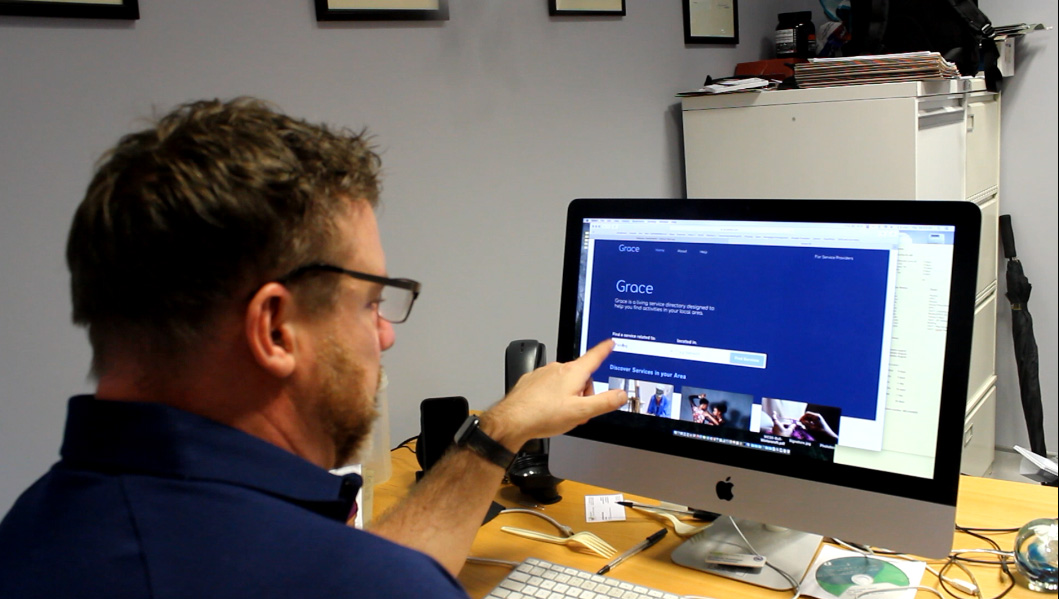
Testing the website with a GP
Why Grace?
Less Wasted Time
Saves GPs and Link Workers from having to make a thousand phone calls to find out what is in the area.
Reliable
Does not become outdated like other services that require human input
Less Strain on The Healthcare System
It can see up to 20% reduction in attendance at general practice, outpatients and emergency departments.
Connecting The Community
Grace can connect the currently disjointed medical and community services to create a more centralised support system for everyone.
Empowering People
Grace allows people to have more of a say what is prescribed to them by providing them more choices of activities and services. This gives older, more isolated people the confidence in engaging with something on their own terms.
More Exposure to Local Communities and Services
Gives a platform and increasing exposure for local services that may not have an online presence or might otherwise go unseen.
Creating New Connections
Having Grace would support the building new social connections, which are really needed once we get older.
“We just talk to each other and make ourselves happy”
Odin’s Wood Day Care Resident
